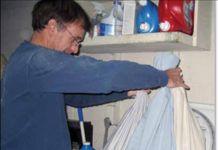There probably are a million diesel engines-Perkins, Ford-Lehmans, Volvo-Pentas, Saabs and others-whose fuel gets its final cleaning by passing through a filter cartridge fitted to a Lucas-CAV filterhead.
Until the advent of spin-on filters, the CAV filterhead, shown in the photo, was standard but never beloved equipment on such diesel engines.
Changing the filter involved backing off a nut on the bottom to drain the unit and catching the gravy in a small bucket or a diaper, the latter recommended by the marine author, Nigel Calder. Then one must loosen a bolt on the top with one hand while with the other hand holding the housing base to keep it from turning. After putting the wrench somewhere other than the bilge, both hands shift to the lower unit, which must be twisted slightly (to free the can from the old O-ring) as it is pulled down.
Dedication is the name of the game, because this must be done while cramped in a position resembling half a paper clip and with slippery fuel oil all over the place. On some particularly miserable installations, you get to do it by feel, because both your head and hands wont fit in the available space.
If you don’t drop anything, you may consider it a job well done-but only if, after re-reassembly, it doesn’t leak, which you wont know until you start the engine, which can’t be done until you bleed the system. If the filter does leak, you are entitled to a dollop of scatology, but no matter how rich the language, you get to start all over again.
Al Kasewurm, a Practical Sailor reader who runs a machine shop in Michigan, found a better way.
Working on an idea originated in Norway, he makes a dish-shaped adapter that fits permanently to the CAV filterhead and forever after permits the use of spin-on, spin-off filter cartridges.
No muss, no fuss, he said, and best of all you need not bleed the system. Just fill the new cartridge with clean fuel oil and thread it home. Start the engine, give it a blip and what little air remains blows right through the engine.
Because its the primary filter, the last stop before hitting the fuel pump, the fuel oil used to fill the cartridge should be very, very clean. Further, there seemed to us to be some doubt, considering that maybe 4 or 5 cubic inches of air are trapped each time the cartridge is changed, about whether bleeding is unnecessary. So, we checked with several diesel mechanics. They said the air clears easily.
Kasewurms Fuel Filter Adapter doesn’t have a fancy name. And its a bit costly because he has the dish cast in aluminum. He or one of his other three machinists then precisely machines the lip, bores and broaches a central intake hole into which is fitted a machined stud, which is threaded to accept cartridges made by AC Delco, Bosch, Fram, Fleetguard, Motorcraft, Purolator-in fact, most manufacturers. The dish is then plated. O-rings and high-quality gaskets seal everything when the unit is installed with the provided bolt, washer and nut. Because its all permanent, Loc-Tite is recommended on the bolt.
It all adds up to $45, with $5 for shipping and handling. (ABC Precision Machining, 2007 Yore Ave., Benton Harbor, MI 49022, 616/926-6322 or fax 616/926-2269.)
Taking Care of Bronze Orphans
We get quite a few calls from readers who have problems replacing or finding parts for old, often-orphaned equipment, like winches, hatches and portlights.
It is, therefore, worth mentioning John C. Edelman. For a decade now, he has been combing the coastlines of North America, poking into old chandlers, ship yards, foundries and salvage yards. Edelman likes good quality metals-like bronze, good plating, whether galvanized or chrome, and even the better grades of brass. His company, Traditional Marine Outfitters, offers an amazing collection of what he calls old stock that has never been used. Among the literally thousands of items are rectangular, round and oval portlights; cowl, gunwale and mushroom ventilators; scuppers; glass prisms; bells; stanchion bases; door and cabinet hardware; caulking irons and belaying pins (wood and bronze); oarlocks; engine controls; fairleads of many kinds; tools; bronze thimbles and chain, and winch handles and roller reefing cranks.
He offers a catalog, for which he charges $5. More importantly, he invites calls, and mail inquiries enclosing a sketch or photo of whatever is needed. Although his office is in Canada, he quotes in US dollars and ships from a warehouse at 58 Fore St., Portland, Maine 04101. If you have any bronze on your boat, tuck this away. You may one day need John C. Edelman. (Traditional Marine Outfitters, P.O. Box 268, Annapolis Royal, Nova Scotia, Canada, BOS 1A0, phone or fax; 800/363-2628.)










